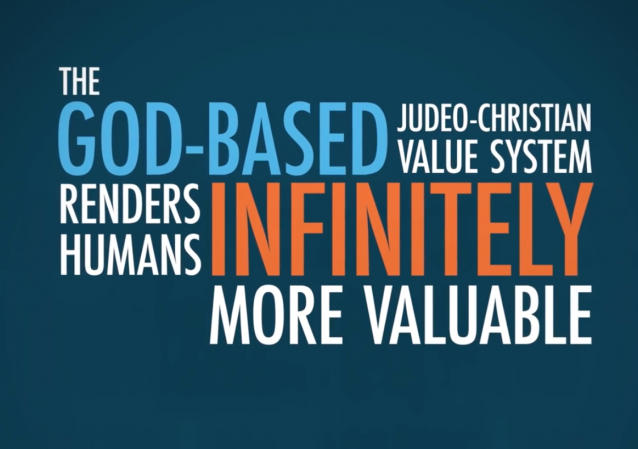If You Saw Your Dog and a Stranger Drowning, Which Would You Save First?
Are humans more valuable than animals?

In the latest from Prager U, Denis Prager suggests your answer to this seemingly simple question everything about how you view the world:
If you saw both your dog and a stranger drowning in the ocean, which would you save first? The answer should be obvious, right? But many people, when asked this question, choose their dog. Why? Because absent the underpinning of the Judeo-Christian value system, which states that only humans are made in God’s image, human worth is diminished. This “secular humanistic” view, when implemented throughout societies, often leads to acts of massive evil. Watch the video here to find out why, although many animals are cute and fuzzy, they should never be equated with people.
Follow Kemberlee on Twitter @kemberleekaye
 DONATE
DONATE
Donations tax deductible
to the full extent allowed by law.









Comments
But a drowning dog will be denied the Beatific Vision. The drowning stranger will not. Ergo, the dog has more to lose.
And there’s absolutely no danger than a dog will try to sue you if your rescue doesn’t work perfectly.
Depends on the dog.
In the non fiction book Death in Yellowstone, one Darwin story after another, a guy jumped into a hot spring pool to save his friend’s dog. It did not turn out well. With his body parboiled and his eyes white like a poached trout, his last words were, “that was a bad idea.”
So sometimes it is better not to act at all.
Tom & EBL…your answers had me laughing. “Beatific Vision” and “depends on the dog”. Ha! Thanks!
What if you are a nonswimmer?
I wouldn’t own a dog that can’t swim, because I can’t swim and the dog would have to save me.
Some human lives are worth more than my dog. Some aren’t. This video comes across as preachy and self-righteous in my opinion, and employs a false-equivalence in order to try to make its point.
Many people who care deeply about their pets have no problem whatsoever with animal experimentation or eating meat.
The initial contention was if YOUR dog and a stranger were drowning, which would you save, not if ANY animal and a stranger…
Making the leap from “people care more about THEIR pets than they do a stranger” to “this is what causes people to join PETA, equate backyard barbecues to the holocaust and oppose animal experimentation for medical research” is a bit of a stretch.
Perhaps I’m a sinner (as are we all), but the choice between my dog and a complete stranger would be a very difficult one.
Depends on the stranger and the situation.
Why are my dog and the stranger in the ocean? Is it because the stranger stole my dog, put him on a boat and the boat sank? Dog wins.
Is the stranger an adult or a child? An innocent child would win that one hands down, an adult would be a bit more iffy.
Did the stranger somehow end up in this situation because of their own stupidity or through no fault of their own?
All these things are important considerations to me. I feel no obligation to save fully functioning adults from their own stupidity. If this makes me a bad person, so be it.
The bottom line is that My dog is a responsibility. It is completely dependent upon me for its survival, much like a child with its parent. It does not have the mental capacity to evaluate situations and make rational decisions. A human adult is responsible for their OWN well-being, has the mental capacity to evaluate situations and the RESPONSIBILITY to assess the risks of any action or activity, properly prepare for or mitigate those risks, or accept the consequences should they CHOOSE to fail to do so (it IS a choice).
With those considerations in mind, regardless of the relative value of a human life over the life of an animal, my responsibilities in a situation like that are much less clear than the video would imply.
Under the Judaeo-Christian structure, ALL human life is more valuable than any animal. There is no consideration of whether stupidity or malfeasance placed that human in the life-threatening situation or not; the human is always more valuable.
To bring in other considerations of human’s age, or the responsibility of pet ownership, or the train of events that lead to the situation, is to reject that concept. It is to claim that humans are not always infinitely valuable; that sometimes they are of lesser value than a dog. And if humans are sometimes of lesser value than a dog, then against what else might a human be of lesser value in comparison?
This is a very dangerous question. When the question has been allowed, we have always – always! – seen the depths of inhumanity that we can sink to. Are today’s generations more resilient to inhumanity than were past generations? I think not.
This is the relative morality that underpins the concept that denies any ascendancy of any entity over another. No, the video was not a presentation of a false choice. What you described is exactly the choice that Mr. Prager was speaking against.